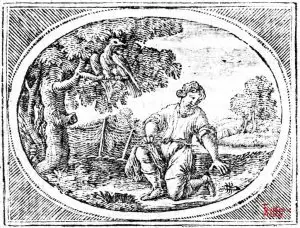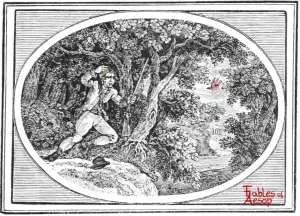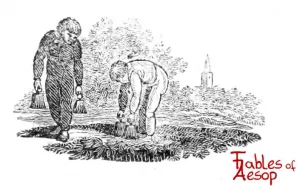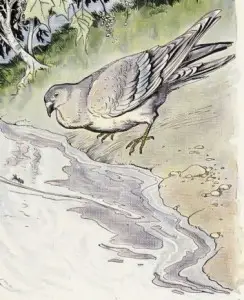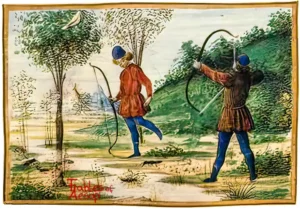A dove about to be caught in a tree was scared away because an ant, seeing the problem, stung the bird catcher who then yelled.
Return favors given to you.

Townsend version
An ant went to the bank of a river to quench its thirst, and being carried away by the rush of the stream, was on the point of drowning. A Dove sitting on a tree overhanging the water plucked a leaf and let it fall into the stream close to her. The Ant climbed onto it and floated in safety to the bank. Shortly afterwards a birdcatcher came and stood under the tree, and laid his lime-twigs [birdlime] for the Dove, which sat in the branches. The Ant, perceiving his design, stung him in the foot. In pain the birdcatcher threw down the twigs, and the noise made the Dove take wing.

Samuel Croxall
THE Ant, compelled by thirst, went to drink in a clear, purling rivulet; but the current, with its circling eddy, snatched her away, and carried her down the stream. A Dove, pitying her distressed condition, cropt a branch from a neighbouring tree, and let it fall into the water, by means of which the Ant saved herself, and got ashore. Not long after, a Fowler having a design upon the Dove, planted his nets in due order, without the bird’s observing what he was about; which the Ant perceiving, just as he was going to put his design in execution, she bit him by the heel, and made him give so sudden a start, that the Dove took the alarm, and flew away.
THE APPLICATION
One good turn deserves another; and gratitude is excited by so noble and natural a spirit, that he ought to be looked upon as the vilest of creatures, who has no sense of it. It is, indeed, so very just and equitable a thing, and so much every man’s duty, that, to speak of it properly, one should not mention it as any thing meritorious, or that may claim praise and admiration, any more than we should say a man ought to be rewarded or commended for not killing his father, or forbearing to set fire to his neighbour’s house. The bright and shining piece of morality therefore, which is recommended to us in this fable, is set forth in this example of the Dove, who, without any obligation or expectation, does a voluntary office of charity to its fellow-creature in distress. The constant, uninterrupted practice of this virtue is the only thing in which we are capable of imitating the great Author of our Being; whose Beloved Son, besides the many precepts he has given to enforce this duty, used this expression as a common saying, It is more blessed to give than to receive.

Thomas Bewick (The Dove and The Bee)
A Bee, whose business had led her to the brink of a purling stream, was snatched away by its circling eddy, and carried down its current. A Dove, pitying her distressed situation, cropped a twig from a tree, and dropt it before her in the water, by means of which the Bee saved herself, and got ashore. Not long after, a Fowler having a design upon the Dove, espied her sitting on a tree, and keeping out of her sight, was waiting the opportunity of shooting her. This the Bee perceiving, stung him on the ear, which made him give so sudden a start, that the Dove instantly took the alarm, and flew away.
APPLICATION.
We ought ever with a ready zeal to extend our arm to relieve a sinking friend from distress and danger, or endeavour to forewarn him against the wicked plots of his enemies. The benevolent man, from the most disinterested motives, will always be disposed to do good offices to all, and the grateful man will never forget to return them in kind, if it be possible; and there is not one good man in the world who may not on some occasion stand in need of the help of another. But gratitude is not very common among mankind. It is a heavenly spark, from which many virtues spring; and the source of pleasures which never enter the breast of the vile ingrate. The favours and kindnesses bestowed upon the grateful man, he cannot forget; those which are conferred upon the ungrateful, are lost: he concludes he would not have had them, if he had not deserved them.
[Note: The JBR and Aesop for Children versions slightly differ in detail but are still the same.]

Aesop For Children
A Dove saw an Ant fall into a brook. The Ant struggled in vain to reach the bank, and in pity, the Dove dropped a blade of straw close beside it. Clinging to the straw like a shipwrecked sailor to a broken spar, the Ant floated safely to shore.
Soon after, the Ant saw a man getting ready to kill the Dove with a stone. But just as he cast the stone, the Ant stung him in the heel, so that the pain made him miss his aim, and the startled Dove flew to safety in a distant wood.
Moral
A kindness is never wasted.

JBR Collection
An Ant going to a river to drink, fell in, and was carried along in the stream. A Dove pitied her condition, and threw into the river a small bough, by means of which the Ant gained the shore. The Ant afterwards, seeing a man with a fowling-piece aiming at the Dove, stung him in the foot sharply, and made him miss his aim, and so saved the Dove’s life.

Gherardo Image from 1480

Formica et Columba
Formica, sitiens, cum ad fontem descendisset ut biberet, in aquam cecidit nec multum abfuit quin misera periret. Columba quaedam, in arbore sedens, misericordia tacta, ramulum in aquam iniecit. Hunc assecuta est formica, eique innatans, mortem effugit. Paulo post adfuit auceps, qui columbae insidiabatur. Formica, ut piae columbae opem ferret, ad aucupem arrepsit et tam vehementer eum momordit ut harundines prae dolore abiiceret. Columba, strepitu harundinum territa, avolavit ac periculum incolumis evasit.
Moral
Iuva et iuvabere; raro beneficium perit.
Perry #235
